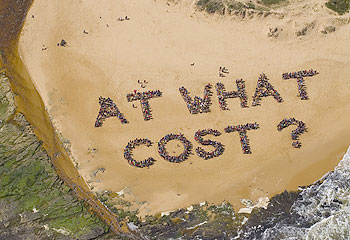Posted on 31 July 2008 By Lynne Plambeck
Santa Clarita Group
| The Santa Clara River, at the site of the proposed 21,000-unit Newhall Ranch project. PHOTO BY LYNNE PLAMBECK |
California Water Law may be an archaic and onerous creature, but at its heart is the wonderful basic concept that the State’s water belongs to the people of California. This rudimentary believe in the justice and right of everyone, including animals and fish, to a life sustaining supply of this most precious of all resources, is one that we certainly do not want to ever give up. So we must understand its importance as well as the ways that public ownership might be serendipitously undermined.
In this day of public/private partnerships, “contracting out” and corporatization of many public services, our water supply and delivery systems have been no less a target of large private corporations than our air waves, our beaches and our transportation services. But loss of our water resources and delivery systems might well be the most disastrous for the public.
Water law asserts itself in California in many forms. We have riparian rights to ensure that farmers near surface water can have access to that water to farm. We have appropriative rights, assigned through a public process with the (hopefully) watchful eye of the State Water Resources Control Boards making sure that the river or stream in not over-allocated. Overlaying rights give a landowner the right to pump water from under his land. But these “rights” are not ownership or property rights, as much as some interests would like to change our law to have them be that. They are merely rights to “beneficial” use of the water. The State and the public still own the water itself.
The Public Trust Doctrine, effectively re-asserted most famously in recent years by the Mono Lake Decision, underlies all these rights with the purpose of protecting our rivers and streams. It ensures that resources “in the Public Trust” such as fish and wildlife will be protected by ensuring that our rivers and streams retain enough high quality surface flow to support their needs. Humans seem to forget sometimes that animals must have a drinking water source, just like us. And fish obviously cannot live without an adequate stream flow or in water that is too polluted to provide the oxygen or the nutrients they need to survive. This enlightened concept has resulted in many legal decisions protecting stream flow and water quality for animals. But it has also resulted in great benefits to the human population by ensuring such important benefits as salmon runs and/or forcing clean-up of polluted water.
Such protections would disappear under a system where water was merely bought and sold to the highest bidder. But it is not only our wildlife that would suffer under such a system. Imagine if your town’s water supply could be sold to the highest bidder and a large corporation bought everything. Soon they set up a bottling operation that pumped so much water from the local source that nearby streams went dry. Residents had to buy the bottled water because no other source was available any longer. That is exactly what has happened or may happen in Idyllwild, McCloud, Gorman and many other towns in California where bottling companies have “bought” water rights. Luckily local citizen groups and enviros are fighting hard to protect their local water resources.
Or what if a large developer could buy up a source of water in another area and transfer it exclusively to his housing development. New houses were built and supplied with that water instead of the existing community, whose water supply had been polluted by industry because they were unable to out bid the developer. Unfortunately, this isn’t such a far fetched scenario when we examine the proposals for huge new towns such as Newhall Ranch in areas like Santa Clarita that have severe water pollution problems. Again, a local group of activists, along with the Sierra Club, stood up to protect our public water supply system.
Last, imagine if our state water delivery system, consisting of dams, hundreds of miles of canals and huge pumps that deliver the water to cities and towns throughout California, became private. Would water be delivered to the highest bidder, so that if Maywood or Watts couldn’t afford the price, they wouldn’t get any? Would water be hoarded in dams by well-funded private investors and manipulated by the market to increase its cost? Would storage capacity be reserved for certain wealthy developers or farming interests and not be equitably distributed throughout the state? Such a scenario is already occurring in the water storage facilities in the central valley, and a public/ private partnership has been proposed to takeover our state water delivery system. Luckily, strong objections continue to be voiced against such proposals.
It is easy to see the implications that privatization of our water supply might have for social justice and our environment. It behooves us all to speak out loudly and strongly against the continued pressure to make our precious water resources and delivery systems a private commodity.

